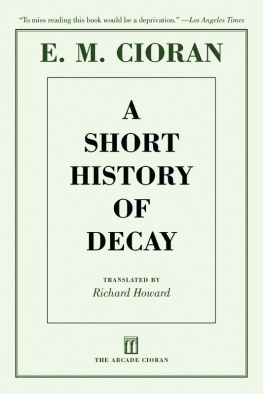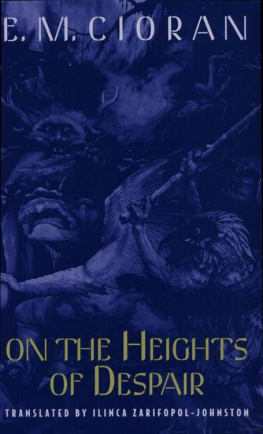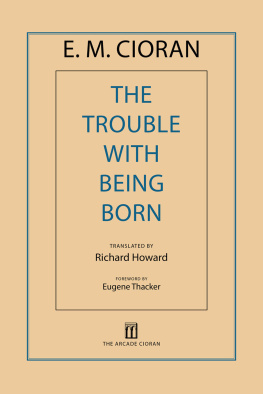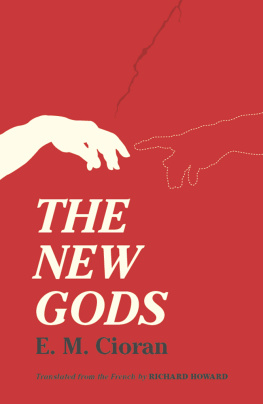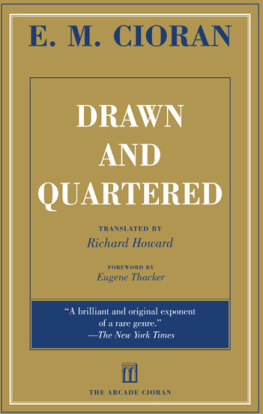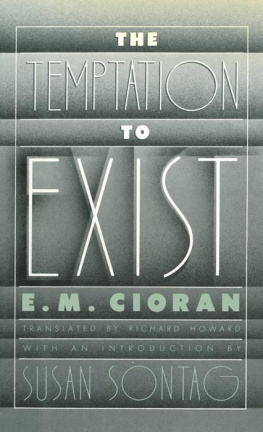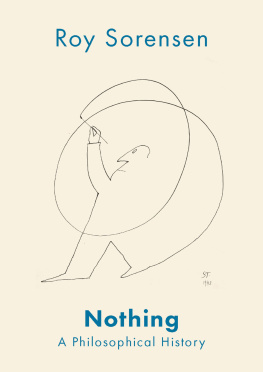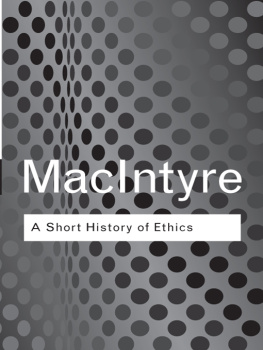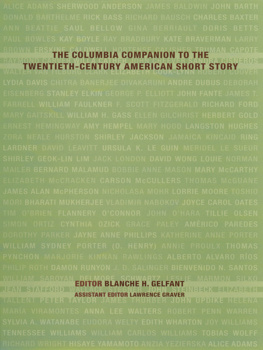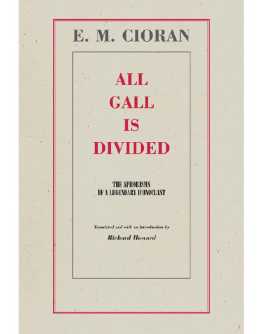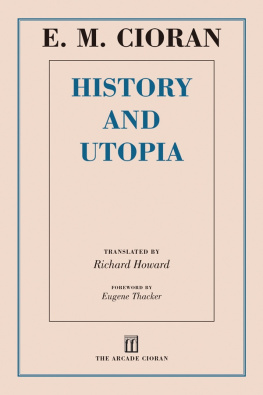BY E. M. CIORAN
Anathemas and Admirations
Drawn and Quartered
History and Utopia
On the Heights of Despair
A Short History of Decay
Tears and Saints
The Temptation to Exist
The Trouble with Being Born
E. M. CIORAN
A Short History of Decay

TRANSLATED FROM THE FRENCH BY RICHARD HOWARD
FOREWORD BY EUGENE THACKER

Copyright 1949 by Editions Gallimard
English-language translation copyright 1975, 2012 by Seaver Books
Foreword copyright 2012 by Skyhorse Publishing, Inc.
All Rights Reserved. No part of this book may be reproduced in any manner without the express written consent of the publisher, except in the case of brief excerpts in critical reviews or articles. All inquiries should be addressed to Arcade Publishing, 307 West 36th Street, 11th Floor, New York, NY 10018.
Arcade Publishing books may be purchased in bulk at special discounts for sales promotion, corporate gifts, fund-raising, or educational purposes. Special editions can also be created to specifications. For details, contact the Special Sales Department, Arcade Publishing, 307West 36th Street, 11th Floor, New York, NY 10018 or arcade@skyhorsepublishing.com.
First published in France under the title Prcis de decomposition
Arcade Publishing is a registered trademark of Skyhorse Publishing, Inc., a Delaware corporation.
Visit our website at www.arcadepub.com.
10 9 8 7 6 5 4 3 2 1
Library of Congress Cataloging-in-Publication Data is available on file.
ISBN: 978-1-61145-736-0
Printed in China
CONTENTS

FOREWORD
by Eugene Thacker
There are writers that one seeks out, and there are writers that one stumbles upon. Emil Cioran is arguably of the latter kind. Such was my own introduction to his work, as a student meandering one rainy afternoon in a used bookstore in Seattle. In the philosophy section, probably squeezed between Cicero and Confucius, was a book that jumped out simply by its title: A Short History of Decay. Spine-creased and slightly dog-eared, it was by an author I knew nothing about. But the title was evocative. Decay, decline, decadencethese are never popular topics, especially in an era such as ours, equally enamored with the explanatory power of science as we are with an almost religious preoccupation with self-help. But how can one write a short history of decay? And is there not something contradictory in assembling a history of decay? Even the original French titlePrcis de decompositionis curious. In French, one often gives the title Prcis to textbook summariesfor example, a Prcis de littrature franaise or a Prcis de mathmatiques. But a precis of decay? It seemed absurd to write such a book. And so I bought it.
That used bookstore no longer exists, though I still have my copy of Ciorans book. Originally published in 1949, A Short History of Decay was the first book Cioran wrote in French. Born in the small Romanian village of Rsinari in 1911, Cioran attended university in Bucharest, where he discovered the works of Pascal and Nietzsche. While there, he befriended Mircea Eliade and Eugne Ionesco, and while still in his twenties, he published several books in Romanian of impassioned and lyrical prose. He also became enthralled by the turbulent politics of the time, an enthusiasm that eventually gave way to disillusionment and bitterness. In the late 1930s, with the support of the French Institute in Bucharest, Cioran was in Paris, ostensibly to write his philosophy thesis. Instead, he spent many of his days bicycling around France. For Cioran it was a time of intense poverty; not only was it difficult to make ends meet, but he experienced both a cultural and linguistic self-exile, writing in a language not his own, in a style composed entirely of fragments, during the long nights of insomnia that he would struggle with his entire life. In the 1940s, against the backdrop of world war, Cioran began a project originally entitled Exercices ngatifs (Negative Exercises), then Penseur doccasion (Second-Hand Thinker), before finally becoming Prcis de decomposition, or A Short History of Decay, in the present translation. The project opened a floodgate in his thinking, resulting in some eight hundred manuscript pages and four different manuscript versions of the book.
When A Short History of Decay was published, it tended to polarize readers. Many dismissed it as overly morose and pessimistic, completely out of tune with the obligatory optimism of postwar European culture. Others praised it for precisely these reasons (in his review of the book, Maurice Nadeau proclaimed Cioran the one whose arrival has been prepared by all the philosophers of the void and of the absurd, harbinger of bad news par excellence"). The original impact of Ciorans book can still be felt in reading A Short History of Decay today. Like Nietzsche, Cioran is intent on exposing the hypocrisies of the human condition; but unlike Nietzsche, Cioran never once offers a way out, a new horizon, or even words of inspiration. And yet, there is an enthusiasm in Ciorans prose that comes through, in spite of his predilection towards pessimism and despair: It is because it rests on nothing, because it lacks even the shadow of an argument that we persevere in life"; How invent a remedy for existence, how conclude this endless cure? And how recover from your own birth? There is a kind of ecstasy of the worst in Ciorans writing that manifests itself in his many voicessometimes philosophical, sometimes poetic, sometimes political, always polemical. A Short History of Decay is at once a work of philosophy and yet a sort of song, a conflicted and agonistic testament of the magnificent futility that is humanityand the ambivalence this book expresses is, arguably, more and more relevant today in our own era of climate change, peak oil, and disasters both natural and artificial.
Though his books are well-regarded today, and though he received many literary prizes for them (nearly all of which he refused), Cioran always held the worlds of literature and philosophy at arms length. His willful experiment with style has largely prevented his work from being easily recognized: neither philosophy nor poetry, neither essay nor novel, neither manifesto nor confession. Perhaps he preferred it this way. Of course, in our digital age is quite easy to find Ciorans books. The real question is why one would read them. In this sense, perhaps the only way to encounter Cioran is to stumble across him, as if by accident or by fate.
DIRECTIONS FOR DECOMPOSITION
Genealogy of FanaticismThe Anti-ProphetIn the Graveyard of DefinitionsCivilization and FrivolityDissolving into GodVariations on Death In the Margin of MomentsDislocation of TimeMagnificent FutilityExegesis of Failure-Coalition against DeathSupremacy of the AdjectiveThe Devil ReassuredPromenade around the CircumferenceThe Sundays of LifeResignationThe Indirect AnimalThe Key to Our EnduranceAnnihilation by DeliveranceThe Abstract VenomThe Consciousness of MiseryInterjective ThoughtApotheosis of the Vague Solitude-Schism of the HeartTwilight ThinkersResources of Self-DestructionThe Reactionary AngelsThe Concern for Decency Gamut of the VoidCertain MorningsMilitant MourningImmunity to RenunciationThe Worlds EquilibriumFarewell to PhilosophyFrom Saint to CynicReturn to the ElementsSubterfugesNon-Resistance to NightTurning a Cold Shoulder to TimeTwo-Faced FreedomOverworked by DreamsThe Model TraitorIn One of the Earths AtticsIndefinite HorrorUnconscious DogmasDualityThe RenegadeShades of the FutureThe Flower of Fixed IdeasThe Celestial Dog"Ambiguity of GeniusIdolatry of DisasterThe DemonThe Mockery of a New Life"Triple ImpasseCosmogony of DesireInterpretation of ActionsLife without ObjectiveAcediaCrimes of Courage and FearDisintoxicationItinerary of Hate"La Perduta Gente"'History and LanguagePhilosophy and ProstitutionObsession of the EssentialFelicity of EpigonesUltimate AudacityEffigy of the FailureConditions of TragedyThe Immanent LieThe Coming of ConsciousnessThe Arrogance of PrayerLypemaniaEveryday CurseDefense of CorruptionThe Obsolete Universe Decrepit Man
Next page
